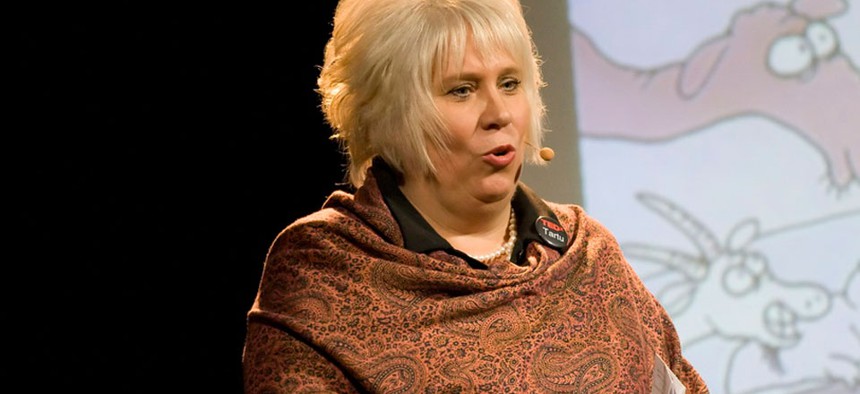Maryland and Estonian Civilians Take Up Arms Against Hackers

Estonian Ambassador Marina Kaljurand said a close parallel to her nation’s cyber reserve is the new Maryland program. Kaimo Puniste/TEDx Tartu
Baltic nation’s ambassador likens her country’s volunteer cyber corps to the U.S. National Guard netwarfare squad.
Maryland has started a volunteer netwarfare squad that the Estonian ambassador likens to her country's groundbreaking civilian cyber reserve, which was assembled after neighboring Russia allegedly shut down the former Soviet state's Internet access in 2007.
The "denial of service attack" paralyzed key industry and government networks for two weeks, and U.S. officials have warned that a similar Internet blackout could happen here soon.
Maryland's 175th Network Warfare Squadron is part of the state's Air National Guard. The squad "provides operational technical, analytical and language support to Air Force and national efforts to identify and mitigate cyber intrusion activities on Department of Defense networks," Maj. Wayde Minami, Maryland Air National Guard public affairs officer, said in an email.
Earlier this year, a bipartisan group of senators introduced legislation that would position a National Guard "Cyber and Computer Network Incident Response Team" in every state. Members of the National Guard Association of the United States backed the measure. They noted that the "bill creates the teams by shifting positions and operations and maintenance funds to the Guard. No new budgetary authority would be created. Defense officials, according to the Guard association, oppose the conditions, arguing the teams would sap resources from department cyber efforts.
At a Georgetown University global cybersecurity summit in April, Estonian Ambassador Marina Kaljurand said a close parallel to her nation’s cyber reserve is the new Maryland program. Estonia's familiarity with the National Guard of the east coast state stems back to a partnership that began after the fall of the Soviet Union. Since 1993, Maryland has helped Estonia transition to an independent nation and the pair now help one another promote stability and democratic principles.
In 2011, Estonian President Toomas Hendrik Ilves told Nextgov that the country's then-new “white-hatted hacker organization” gathers information technology professionals from banks, insurance companies and other private businesses who want to do something "defense-related" during the evenings or on weekends. “Since we live in this modern era, it's not only riding around in the woods with guns,” Ilves explained. “So why don't we set this thing up where you can volunteer and we will support you materially to work on defense? It's only about three months old but it’s widely popular among geeks.”
But there is some concern about cybersecurity firms or extremist groups becoming cyber mercenaries. At the Georgetown conference, Eric Rosenbach, the Pentagon's deputy assistant secretary of defense for cyber policy, said Defense does not want a cyber "militia."
Minami responded, "I assume the concern is about local groups forming ad hoc bands of 'cyber warriors' that have no legal authority to exist. This is definitely not the case with the 175th Network Warfare Squadron, which is a federally recognized military unit, just like any other in the Air National Guard.”
Homeland Security Department officials have been supportive of the concept of a National Guard-like band of cyber specialists to ensure capable professionals are on tap in times of national crises.
The House also has attempted galvanizing a formal cyber national guard. A 2002 law permits Homeland Security to create a volunteer “NET Guard” for cyber response. An attempt at cybersecurity reforms last year would have required that DHS officials consider using grants to get the effort going and maintain it through a “national volunteer experts registry system.”
(Image via Flickr user tedxtartu)






